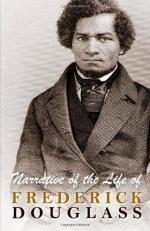In the afternoon of the day when I reached New Bedford, I visited the wharves, to take a view of the shipping. Here I found myself surrounded with the strongest proofs of wealth. Lying at the wharves, and riding in the stream, I saw many ships of the finest model, in the best order, and of the largest size. Upon the right and left, I was walled in by granite warehouses of the widest dimensions, stowed to their utmost capacity with the necessaries and comforts of life. Added to this, almost every body seemed to be at work, but noiselessly so, compared with what I had been accustomed to in Baltimore. There were no loud songs heard from those engaged in loading and unloading ships. I heard no deep oaths or horrid curses on the laborer. I saw no whipping of men; but all seemed to go smoothly on. Every man appeared to understand his work, and went at it with a sober, yet cheerful earnestness, which betokened the deep interest which he felt in what he was doing, as well as a sense of his own dignity as a man. To me this looked exceedingly strange. From the wharves I strolled around and over the town, gazing with wonder and admiration at the splendid churches, beautiful dwellings, and finely-cultivated gardens; evincing an amount of wealth, comfort, taste, and refinement, such as I had never seen in any part of slaveholding Maryland.
Every thing looked clean, new, and beautiful. I saw few or no dilapidated houses, with poverty-stricken inmates; no half-naked children and barefooted women, such as I had been accustomed to see in Hillsborough, Easton, St. Michael’s, and Baltimore. The people looked more able, stronger, healthier, and happier, than those of Maryland. I was for once made glad by a view of extreme wealth, without being saddened by seeing extreme poverty. But the most astonishing as well as the most interesting thing to me was the condition of the colored people, a great many of whom, like myself, had escaped thither as a refuge from the hunters of men. I found many, who had not been seven years out of their chains, living in finer houses, and evidently enjoying more of the comforts of life, than the average of slaveholders in Maryland. I will venture to assert, that my friend Mr. Nathan Johnson (of whom I can say with a grateful heart, “I was hungry, and he gave me meat; I was thirsty, and he gave me drink; I was a stranger, and he took me in”) lived in a neater house; dined at a better table; took, paid for, and read, more newspapers; better understood the moral, religious, and political character of the nation,—than nine tenths of the slaveholders in Talbot county Maryland. Yet Mr. Johnson was a working man. His hands were hardened by toil, and not his alone, but those also of Mrs. Johnson. I found the colored people much more spirited than I had supposed they would be. I found among them a determination to protect each other from the blood-thirsty kidnapper, at all hazards. Soon after my arrival, I was told of




